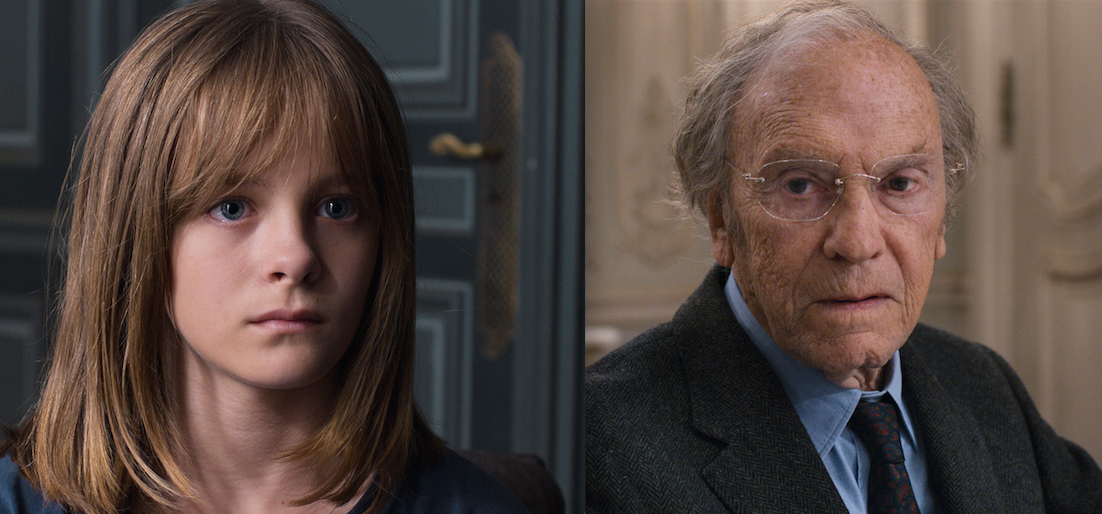TIFF: Haneke & Huppert Return with "Happy End"
 Friday, September 8, 2017 at 3:30PM
Friday, September 8, 2017 at 3:30PM by Chris Feil
Michael Haneke is back to satirizing the upper class for Happy End, a bitter comedy on conscious distraction and privilege in the digital age. The film opens with ominous Snapchat footage and is peppered with live time Facebook chat and email screenshots that feel strangely right at home in the auteur’s aesthetic. But this isn’t Haneke’s treatise against internet platforms - in his eye, these are just other ways to reveal our disaffected, sometimes wicked selves...

The film centers on the Laurents, a wealthy banking family going through their own upheavals: Isabelle Huppert plays newly engaged matriarch Anne, combatting her son Pierre’s inability to meet her expectations; Mathieu Kassovitz is an adulterous Thomas, reintroducing his estranged middle-class teenage daughter Eve to the family; and Jean-Louis Trintignant is the aging patriarch Georges. Meanwhile the Laurents have exactly the kind of self-congratulatory, disregarding attitude to people of color and refugees that you anticipate: their internal discord eclipses the injustice they dispel.
Happy End however is much more slippery than Haneke’s last few features, and in ways that subtly subvert our expectations of how we expect him to reveal information. As always, Haneke delights in making us work to catch up to him without breaking a sweat himself. The director knows when our eyes and mind will begin to wander in attempt to stay ahead of what he’ll deliver, casting aside a reveal or two as insignificant. Like the Laurents, he’s telling us our minds are on the stuck on the wrong information. Happy End may be his most casually dispatched and a welcome change of pace to his most recent films.
While initial word called Happy End a Haneke greatest hits, the film carries nothing of the laziness that (not entirely unfair) reduction suggests. On the contrary - this film is light on its feet, briskly paced while loading the frame and proceedings with more than we can take in at once. And you can a few more signature Haneke moments to the heap, like the pitch-black hilarity of its ending and a karaoke performance of Sia’s “Chandelier” that vacillates wildly between uproarious and deeply sad.

But the most significant turns come from Jean Louis Trintignant and Fantine Harduin as grandfather and granddaughter, the two most distantly associated but similarly disposed of the Laurent hierarchy. Theirs becomes the film’s defining relationship and its best performances. As Eve, Harduin possesses all of the feeling that the Laurents can’t be bothered with, barely able or willing to contain her sadness or burgeoning sense of rebellion. Perhaps its her adjacency to her castmate that calls up the comparison, but the layers and devilish control she brings to her youthful performance recall shades of Huppert. Trintignant is cruelly hilarious and casually affrontive without becoming an empty, unfeeling caricature. His poisoned humanity gives the film its rotted core, with enough subtlety to make the film and performance be something more corrosive than explosive.
The film itself does reach a big bang of a finale after spending most of the film patiently laying all of its cards for one singular narrative payoff. To some, this may feel comparatively soft in on Haneke spectrum but Happy End is more rewarding in the rumination than the conclusions.
Grade: A-



Reader Comments (4)
Michael Haneke puts my ass in the seat!
I am sorry, but I am kind of done with this kind of misanthophy in which a girl kills an animal during the initial credits.
Haneke's characters are not human anymore, they're just voodoo dolls.
A-? Yikes. That seems generous even by positive responses I have seen. I have wavered with this film. The first 40 minutes felt rudderless and perfunctory, but it did eventually start to show signs of life. I don't think it ever got anywhere particularly revelatory, but I ultimately enjoyed the film. It's certainly the funniest of his career and that final scene - that final SHOT - is one of the biggest laughs I've had all year.
Austria chose Happy End as the film that represented them at the Oscars. It is the fourth time that a film directed by Michael Haneke is going to represent Austria in the Oscars (not counting Caché which was disqualified)
However I have the impression that this movie has not had the acclaim of other films by Haneke.